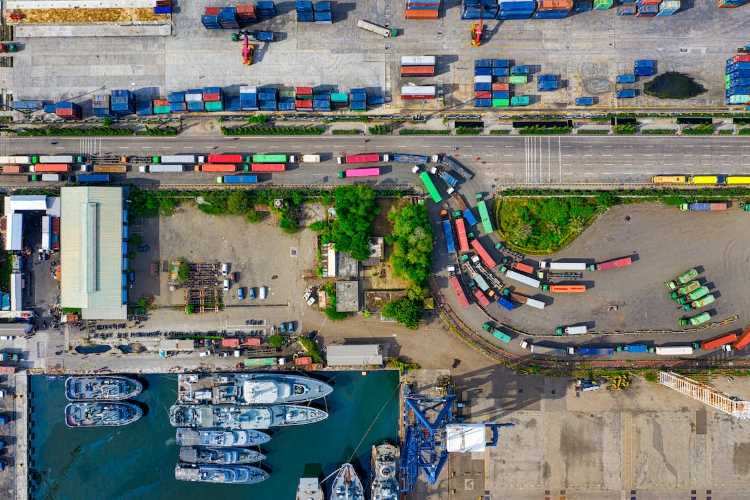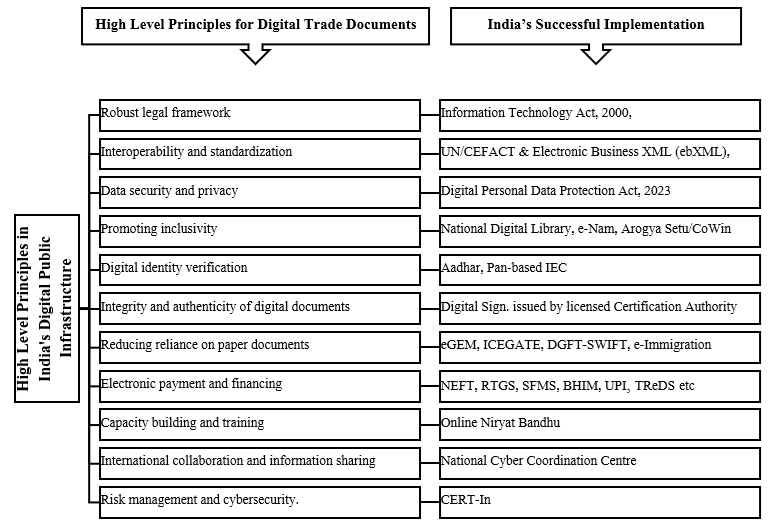
India a global leader in Digital Public Infrastructure: The recent G-20 Summit in Delhi marked a significant step forward in global efforts to digitise trade documents. At this summit, G-20 leaders unanimously endorsed the Delhi Declaration which includes the ‘High-Level Principles on Digitalisation of Trade Documents‘ These principles are recognised for their crucial role in unlocking the potential of international trade, thereby promoting sustained, inclusive, and resilient economic growth worldwide. They seek to create an ecosystem that allows for seamless, cost-effective, and timely trade.
Understanding these principles is essential, not only for grasping their importance but also for recognising how they underpin India’s robust Digital Public Infrastructure (DPI) and its central role in unlocking economic and business opportunities. India’s successful implementation of these principles opens up a plethora of business opportunities, especially in the developing world.
The High-Level Principles on Digitalisation of Trade Documents constitute guidelines and standards aimed at promoting the digitisation of trade-related documents and processes in international trade. Recognised in the Delhi Declaration by G-20 leaders, these principles are designed to create a more efficient, secure, and accessible framework for trade transactions, thereby boosting global economic growth.
READ I The 16th Finance Commission must address fiscal equity concerns
These 11 principles include establishing a robust legal framework, ensuring interoperability and standardisation, maintaining data security and privacy, promoting inclusivity, verifying digital identities, ensuring the integrity and authenticity of digital documents, reducing reliance on paper, facilitating electronic payments and financing, enhancing capacity building and training, fostering international collaboration and information sharing, and focusing on risk management and cybersecurity. Collectively, these principles offer a comprehensive framework for digitalizing trade processes, aiming to create a global environment conducive to digital trade, thereby increasing efficiency, transparency, and economic growth in international commerce.

The Digital Public Infrastructure
India’s DPIs have seen remarkable growth since 2009, attributed to three key factors: strategic vision, technological innovation, and broad implementation across sectors. The India Stack, a robust suite of integrated applications, caters to India’s diverse population of over a billion individuals across 29 states and 22 languages. The DPIs stand out for their widespread applicability, rapid payment systems, and reliable identity verification.
Aadhaar, India’s unique biometric identification system, has been pivotal in transforming identity authentication. With over a billion enrollments, Aadhaar is integral to various government services, enhancing tasks from banking to welfare access. The Jan Dhan Yojana programme exemplifies India’s commitment to financial inclusion.
India’s digital strides include DigiLocker, revolutionising document access and sharing, and eSign, an electronic signature service that streamlines transactions. These initiatives, aligning with high-level principles for electronic trade, have garnered global recognition. India’s digital payment systems, like BHIM and UPI, align with the government’s digital economy goals. The Goods and Services Tax Network (GSTN) and digital income tax processes have streamlined tax compliance and boosted tax collections.
The Government e-Marketplace (GeM) has transformed government procurement, and ICEGATE has enhanced customs efficiency. DGFT-SWIFT offers valuable online international trade services. India’s digital initiatives in education, like ePathshala and Diksha, and the AICTE Student Portal, provide extensive e-learning resources. India’s CoWIN technology is aiding global vaccine campaigns, exemplifying its citizen-centric governance model.
Business prospects via DPI
India’s DPI success story, recognised globally, has sparked interest in over 40 countries, creating significant business opportunities for Indian IT firms. These companies can partner with developing nations to develop tailored digital solutions, especially in sectors like Banking, Financial Services, and Insurance (BFSI). This collaboration can drive economic growth both domestically and internationally.
The high-level principles for the digitalisation of trade documents lay the groundwork for modernizing trade processes, making international trade more efficient and accessible. India, with its legal framework, data security measures, and commitment to inclusivity, is at the forefront of implementing these principles globally. The adoption of these principles streamlines business processes, reduces paperwork, and fosters a conducive business environment, ultimately contributing to sustained global economic growth and resilience. This presents Indian IT companies with the opportunity to expand their services worldwide, promoting good governance and benefiting millions through digital governance.
Recent studies highlight the transformative power of DPI in areas beyond trade. One strand sees India’s open-source approach empowering local entrepreneurs to develop solutions for social impact, bridging the gap between government and marginalised communities. Another thread explores the potential for India’s digital platforms to leapfrog developing nations past legacy systems, fostering rapid and inclusive growth.
On the global stage, India’s DPI serves as a reference model, attracting collaborations and knowledge exchange that benefit all. From enabling telemedicine in remote villages to fostering cross-border e-governance, the ripple effects of India’s digital journey are only beginning to be felt. As the world embraces the digital age, India stands poised not just as a leader, but as a catalyst, its DPI illuminating the path towards a more equitable and prosperous future for all.
(Dr Ram Singh is professor, IIFT New Delhi. Views expressed are personal.)
